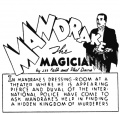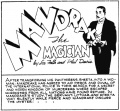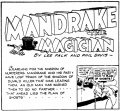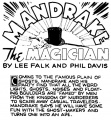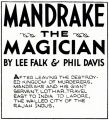Spotlight on Sunday strip layout: Difference between revisions
mNo edit summary |
mNo edit summary |
||
| Line 1: | Line 1: | ||
== | == First years == | ||
{{stub}} | {{stub}} | ||
The early Mandrake Sunday strips filled an entire newspaper page. Phil Davis layout his first Sunday story with 4 strips a page before he started experimenting with different variants of layout. The various pages could have 2, 3 or 4 strips and some panels could span more than one row. | |||
<gallery> | |||
Image:ms-19350203.jpg | |||
Image:ms-19370221.jpg | |||
</gallery> | |||
In the first Sunday story Phil Davis also experimented with the logo for the pages. | |||
<gallery> | |||
Image:ms-logo-01-a.jpg | |||
Image:ms-logo-01-b.jpg | |||
Image:ms-logo-01-c.jpg | |||
Image:ms-logo-02-a.jpg | |||
Image:ms-logo-02-b.jpg | |||
Image:ms-logo-03-a.jpg | |||
Image:ms-logo-03-b.jpg | |||
Image:ms-logo-03-c.jpg | |||
</gallery> | |||
Because of paper shortages during World War II the size of Sunday strips began to shrink. | |||
<gallery> | |||
Image:ms-logo-04-a.jpg | |||
Image:ms-logo-04-b.jpg | |||
Image:ms-logo-05-a.jpg | |||
</gallery> | |||
After the war, strips continued to get smaller and smaller, to save the expense of printing so many color pages. | |||
When Sunday strips began to appear in more than one format, it became necessary for the cartoonist to follow a standardized strip layout, which provides newspapers with the greatest flexibility in determining how to print a strip. | |||
<gallery | ==Sunday strip layout 4== | ||
<gallery> | |||
Image:s-layout_70-half.png|designed to fill full a newspaper page | |||
Image:s-layout_70-half.png|designed to fill half a newspaper page | Image:s-layout_70-half.png|designed to fill half a newspaper page | ||
Image:s-layout_70-third.png|designed to fill a third of a newspaper page | Image:s-layout_70-third.png|designed to fill a third of a newspaper page | ||
Revision as of 14:53, 18 July 2013
First years
|
This article, or section of an article, is very short. You can help MandrakeWiki by expanding it. |
The early Mandrake Sunday strips filled an entire newspaper page. Phil Davis layout his first Sunday story with 4 strips a page before he started experimenting with different variants of layout. The various pages could have 2, 3 or 4 strips and some panels could span more than one row.
In the first Sunday story Phil Davis also experimented with the logo for the pages.
Because of paper shortages during World War II the size of Sunday strips began to shrink.
- Ms-logo-05-a.jpg
After the war, strips continued to get smaller and smaller, to save the expense of printing so many color pages.
When Sunday strips began to appear in more than one format, it became necessary for the cartoonist to follow a standardized strip layout, which provides newspapers with the greatest flexibility in determining how to print a strip.


